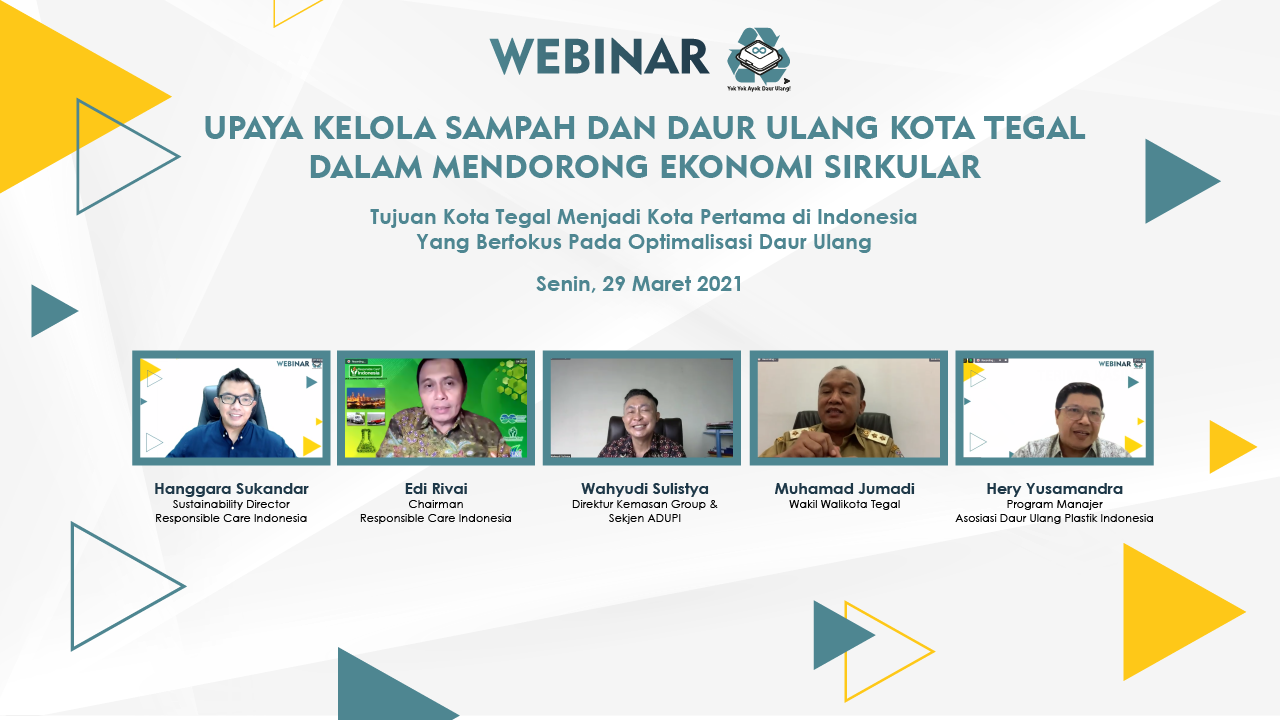
Tegal, March 29, 2021 - After the inauguration of a waste recycling center located in Mintaragen subdistrict on February 24, the Tegal City Government together with PT Trinseo Materials Indonesia and PT Kemasan have consistently implemented the Yok Yok Ayok Daur Ulang! Program supported by various organizations, such as the Association of Indonesian Olefin, Aromatic & Plastic Industries (INAPLAS); Indonesian Plastic Recycling Association (ADUPI); Indonesian Scavenger Association (IPI); and Responsible Care® Indonesia.
Through a webinar entitled "Tegal City’s Waste Management and Recycling Efforts in Driving Circula Economy'' hosted by Hanggara Sukandar, Sustainability Director of Responsible Care® Indonesia, the discussion this time focuses on waste management and recycling efforts in promoting a circular economy. This time, the Tegal City Government is inviting the public and governments in other cities to participate in implementing waste management and recycling programs, especially plastic waste.
The volume of waste that is not managed properly and the amount of waste that ends up in the landfills is still a problem caused by the lack of optimization in managing and recycling plastic waste in this country. Based on data collected by the Tegal City Government, it is noted that every day Tegal City residents produce up to 250 tons of waste, of which 30% is plastic waste, 214 tons of total landfill waste, and 16 tons of inorganic waste volume. Of this amount, only 10% is currently able to be sent to the recycling industry and the rest ends up in the landfill.
Muhammad Jumadi as Vice Mayor of Tegal, said that the existence of a waste recycling center is expected to help reduce the volume of waste, especially plastic waste to landfill, and is also able to play a role in achieving a circular economy.
"Currently, the waste management and recycling program has been carried out at TPS 3R in Mintaragen village. In the future, Tegal City is targeting that this program can also be implemented at the household level, so that it is hoped that only residual waste that cannot be processed will end up in the TPA. Through education that never ends, we describe waste recycling activities, for example how to recycle plastic waste into handicrafts."
There are still many assumptions circulating in the community that environmentally friendly products are products that can be decomposed naturally, so this has led people to assume that products that cannot be decomposed naturally are products that are not environmentally friendly.
Responding to this problem, Wahyudi Sulistya, Secretary General of the Indonesian Plastic Recycling Association (ADUPI) explained, "people cannot rely on nature or the environment to break down plastic waste. Starting from yourself, can be from the household scale. In conditions like now, people must learn to manage, sort out types of waste and also recycle plastic waste to help promote a circular economy."
Supporting Wahyudi's statement, Hery Yusamandra, Program Manager of the Indonesian Plastic Recycling Association (ADUPI), explained that currently technology is becoming more sophisticated with the availability of machines that can process plastic waste in a short time into new products, for example briquettes through waste predator machines that already run by the Tegal City plastic waste recycling center.
Responsible Care® Indonesia (RCI), as one of the supporting organizations for the "Yok Yok Ayok Daur Ulang!" represented by Edi Rivai, Chairman of Responsible Care® Indonesia explained the circular economy goals through waste management and recycling efforts. "Circular economy aims to maximize the material use cycle to minimize waste production by recovering and reusing various products and materials repeatedly in a systematic manner."
Edi again explained that it is true that the implementation of plastic waste management and recycling in Indonesia has various challenges, starting from technical matters where the use of multi-materials makes it difficult to recycle, infrastructure is still minimal, consumer habits are still bad, and also government regulations. counter productive. Therefore, the implementation of waste recycling can be started from the selection of waste that comes from the source.
"Implementation of Zero Waste Office Management at the Head Office and Factory can be done to reduce waste that is not managed and then accumulates in the TPA. Segregated waste will be collected and managed separately according to each type of material. This system has been implemented by one of the RCI members and it was noted that in the period January - September 2020 it managed to reduce waste by 53% to TPA," concluded Edi.
The waste problem currently being faced by the people of Indonesia already has a solution, namely waste management and recycling. How does the process of sorting waste have to be done from the smallest scale, namely the household. Thus, it will be easier for each agency related to waste management for the next process, namely recycling.